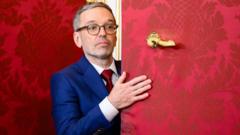In a significant political development in Austria, President Alexander Van der Bellen has tasked Herbert Kickl, the leader of the far-right Freedom Party (FPO), with forming a coalition government. If successful, this would mark the first time that the Eurosceptic and Russia-friendly FPO leads a government in the country, despite having previously served only as a junior coalition partner.
The FPO emerged victorious in the September elections, securing approximately 29% of the vote, but faced initial backlash, as Van der Bellen was criticized for delaying the coalition-building process due to other parties' refusals to work with Kickl. Following the election, the conservative People's Party (OVP), which placed second with 26% of the votes, was given the opportunity to form a government. However, their attempts to create a stable coalition failed, leading to the resignation of former Chancellor Karl Nehammer.
With the emergence of a new OVP leader, Christian Stocker, who expressed willingness to engage in coalition talks with Kickl, the political climate has shifted. Interestingly, Van der Bellen's decision to ask Kickl to take charge of coalition negotiations reflects a dramatic pivot from the president, who has historically been critical of the FPO and expressed concerns regarding Kickl’s leadership.
Despite the ongoing negotiations, Van der Bellen emphasized the importance of upholding democratic principles, including human rights and independent media, as well as maintaining Austria's relationship with the European Union. The FPO and OVP share some ideological ground, particularly on migration policies, yet diverge significantly on EU matters and aid to Ukraine amidst ongoing geopolitical tensions.
While there is no confirmed timeline for the coalition discussions—which typically take two to three months—the potential for a snap election looms if talks do not yield results. According to current polls, public support for the Freedom Party appears to be increasing in the wake of the elections, indicating a dynamic shift in Austria's political landscape.




















